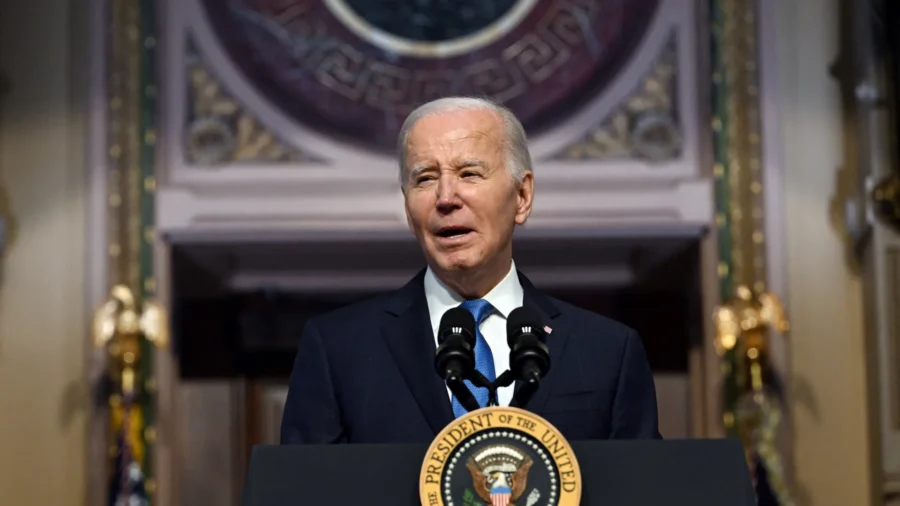The White House announced that 230,000 more doses of respiratory syncytial virus (RSV) immunizations will be made available for infants in January.
“On Wednesday, senior Biden-Harris Administration officials met again with manufacturers of RSV immunizations including Sanofi and AstraZeneca and their partners. They discussed the need for manufacturers to work quickly to meet demand for dose availability through the commercial market this viral season. At the urging of the Administration, manufacturers confirmed that they will make available 230,000 additional doses of RSV immunizations for infants in January,” the White House said in a Dec. 14 statement.
Beyfortus, also called nirsevimab, is an RSV vaccine manufactured by Sanofi and AstraZeneca. The vaccine was approved in July this year.
“This announcement comes on top of the 77,000 additional doses of Beyfortus that were released last month following the Administration’s continued efforts’ urging manufacturers to expedite availability,” the White House stated.
The U.S. Centers for Disease Control and Prevention (CDC) has recommended RSV immunization right from birth. Up to the age of 18, the CDC recommends nirsevimab immunization against RSV.
Nirsevimab is not exactly a vaccine, according to the CDC. Vaccines stimulate the individual’s immune system to trigger an immune response. In contrast, nirsevimab is a monoclonal antibody that provides direct protection against RSV to the individual.
Nirsevimab is aimed at newborns and babies under one year old born during or entering their first RSV season. The antibody is also prescribed for children up to the age of 24 months who remain at risk of severe RSV disease through their second RSV season.
According to the CDC, around 58,000 to 80,000 children younger than five years old are hospitalized due to RSV infection annually. Only 100–300 deaths are registered in this demographic each year. With so few cases of hospitalizations and deaths, questions have been raised about immunizing young children with RSV vaccines.
In an Aug. 4 Substack post, Dr. Meryl Nass, a physician and researcher, cited CDC data to state that 25 babies up to the age of one year died from RSV in the United States annually on average over a 12-year period.
“[Four] million babies are born yearly in the U.S. 20,000 die in their first year. RSV kills 0.125 percent of them. It is way down the list of top causes of death,” she wrote. “RSV almost never causes chronic problems, except perhaps asthma. Or maybe children with an asthma tendency are also more susceptible to severe RSV.”
“RSV does hospitalize a lot of U.S. infants. It frightens parents and causes a lot of work for doctors. And so this group of pediatricians on CDC’s advisory committee went gaga over this new product (nirsevimab), which is supposed to be 70–80 percent effective at preventing severe RSV disease,” she wrote.
Risks of Monoclonal Antibodies
The fact that nirsevimab is a monoclonal antibody has also raised concerns. “Has any monoclonal antibody product been given on a mass scale to children ever? No,” Dr. Nass notes.
Monoclonal antibodies are copies of an antibody that seek out foreign material to destroy them. Such treatments come with a risk that the body might trigger a strong reaction to the antibodies.
Some of the common complications can include shortness of breath, fever, rashes, changes in blood pressure, sweating, and high heart rate. More serious consequences can be acute anaphylaxis or life-threatening massive allergic reactions and cytokine release syndrome that can result in organ damage.
According to CNBC, 12 infants who had received nirsevimab in clinical trials died. However, a review by the U.S. Food and Drug Administration concluded that the deaths were not related to the antibody treatment.
“Most deaths were due to an underlying disease … None of the deaths appeared to be related to nirsevimab,” said Dr. Melissa Baylor, an FDA official.
The agency found incidences of skin rash and hypersensitivity reaction in the infants who received nirsevimab in the trials, with the number of cases deemed to be low. Ms. Baylor said that such reactions may occur once nirsevimab is approved for use in children.
Dr. Peter A. McCullough pointed out in October that “RSV, like influenza and COVID-19, are easily treatable infections at home.”
“I am not recommending COVID-19 XBB.1.5 boosters, influenza, or respiratory syncytial virus vaccines for healthy adults or children. None of these vaccines are compelling and conditions are easily treatable,” he wrote.
“For healthy persons, it is perfectly reasonable to skip Fall vaccines and seek early treatment in the rare circumstance that one of these viral infections is contracted.”
The CDC also recommends a vaccine manufactured by Pfizer for countering RSV in infants. Pfizer’s bivalent RSVpreF vaccine (Abrysvo) is approved for use among pregnant women during weeks 32 through 36 of pregnancy between September and January.
A recent investigation found that Pfizer failed to disclose potential risks to babies in an RSV vaccine trial done on pregnant women. The study was done by researchers at the British Medical Journal.
The CDC says that the clinical trial of Abrysvo saw hypertensive disorders of pregnancy occur in 1.8 percent of pregnant women who received the vaccine compared to only 1.4 percent of those who did not receive the shot.
“Pre-eclampsia, low birth weight (meaning less than 5.5 lbs), and jaundice in newborns occurred more frequently in infants born to mothers who received the RSV vaccine compared to infants born to mothers who received a placebo,” it said.
The Epoch Times reached out to the CDC for comment.
From The Epoch Times


